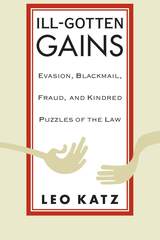
"An ambitious and well-written book of legal and moral theory to overthrow both utilitarianism and its cousin, the economic approach to law."—Richard A. Posner, New Republic
"A good, well-written book full of interesting examples."—Library Journal
"[An] elegant defense of circumvention and subterfuge . . . a heroically counterintuitive book."—Malcolm Gladwell, New Yorker

Surveys reveal that a majority of Americans believe government is run for special interests, not public interest. The increased presence and power of lobbyists in Washington and the excesses of PAC and campaign contributions, in-kind benefits, and other favors would seem to indicate a government of weak public servants corrupted by big private-interest groups.
But as Fred McChesney shows, this perspective affords only a partial understanding of why private interests are paying, and what they are paying for. Consider, for example, Citicorp, the nation's largest banking company, whose registered lobbyists spend most of their time blocking legislation that could hurt any one of the company's credit-card, loan, or financial-service operations. What this scenario suggests, the author argues, is that payments to politicians are often made not for political favors, but to avoid political disfavor, that is, as part of a system of political extortion or "rent extraction."
The basic notion of rent extraction is simple: because the state can legally take wealth from its citizens, politicians can extort from private parties payments not to expropriate private wealth. In that sense, rent (that is, wealth) extraction is "money for nothing"--money paid in exchange for politicians' inaction. After constructing this model of wealth extraction, McChesney tests it with many examples, including several involving routine proposals of tax legislation, followed by withdrawal for a price. He also shows how the model applies more generally to regulation. Finally, he examines how binding contracts are written between private interests and politicians not to extract wealth.
This book, standing squarely at the intersection of law, political science, and economics, vividly illustrates the patterns of legal extortion underlying the current fabric of interest-group politics.

Sexual blackmail first reached public notice in the late eighteenth century when laws against sodomy were exploited by the unscrupulous to extort money from those they could entrap. Angus McLaren chronicles this parasitic crime, tracing its expansion in England and the United States through the Victorian era and into the first half of the twentieth century. The labeling of certain sexual acts as disreputable, if not actually criminal--abortion, infidelity, prostitution, and homosexuality--armed would-be blackmailers and led to a crescendo of court cases and public scandals in the 1920s and 1930s. As the importance of sexual respectability was inflated, so too was the spectacle of its loss.
Charting the rise and fall of sexual taboos and the shifting tides of shame, McLaren enables us to survey evolving sexual practices and discussions. He has mined the archives to tell his story through a host of fascinating characters and cases, from male bounders to designing women, from badger games to gold diggers, from victimless crimes to homosexual outing. He shows how these stories shocked, educated, entertained, and destroyed the lives of their victims. He also demonstrates how muckraking journalists, con men, and vengeful women determined the boundaries of sexual respectability and damned those considered deviant. Ultimately, the sexual revolution of the 1960s blurred the long-rigid lines of respectability, leading to a rapid decline of blackmail fears. This fascinating view of the impact of regulating sexuality from the late Victorian Age to our own time demonstrates the centrality of blackmail to sexual practices, deviance, and the law.

READERS
Browse our collection.
PUBLISHERS
See BiblioVault's publisher services.
STUDENT SERVICES
Files for college accessibility offices.
UChicago Accessibility Resources
home | accessibility | search | about | contact us
BiblioVault ® 2001 - 2024
The University of Chicago Press









